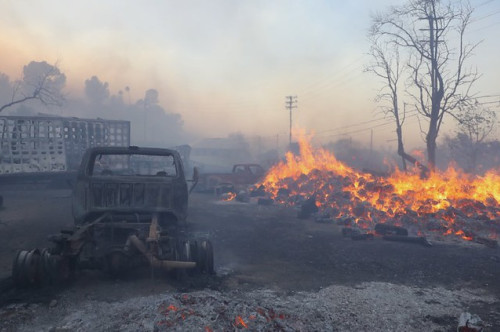
From the Center
Next week, we’ll all be talking about Donald Trump’s inauguration. Then we’ll spend most of the next few months discussing his plans for taxes and border policy and energy (and perhaps Greenland and Panama and Canada). But this week, as my adopted city of Los Angeles continues to burn out of control, let’s talk about people rather than politicians.
Make no mistake: even as thousands of Southern California homes burn to the ground and their former residents scramble for shelter, food and the smallest shreds of normalcy, there still has been more than enough political positioning, finger-pointing and blame-laying to be found. Trump blamed California Governor Gavin Newsom for mishandling the state’s water policy. Newsom promised to investigate local officials for their lack of preparation. And Los Angeles Mayor Karen Bass defended herself for being out of the country when the fires erupted.
Although the most committed skeptics of climate change will labor mightily to identify other causes for the fires, it’s clear that a warming planet and the accompanying meteorological abnormalities have played a significant role in the growing frequency of these types of infernos. But at the time this was written, the most damaged areas of the greater LA region shared another critically important characteristic beyond temperature, precipitation, and wind. In each of these communities, a noticeable common denominator has been the immense amount of foliage that has been permitted to grow in dangerous proximity to private homes.
We know that when trees and shrubbery and undergrowth are dry, they are extremely susceptible to fire. We know that when this type of vegetation is too close to buildings, those structures become more vulnerable to fast-moving flames. But many of us continue to build homes in hazardous places, because we enjoy the views, the landscapes, and the charm of simulated rural living. We prioritize aesthetics over safety, and we pay the price.
Our country learned just over a century ago during the ill-fated experiment of Prohibition that forbidding certain types of conduct is an uncomfortable role for government. But nudging rather than banning has seemed to be more successful. We haven’t outlawed motorcycles, but we now require helmets. Drinking is legal, but the penalties for drunk driving are much stricter.
So this is not to suggest that government should forbid their citizens from living where they choose, although a common feature of the incinerated communities are large numbers of homeowners who have resisted years of efforts to pass regulations that require a sufficient amount of clearing that surrounds their dwellings. Once the current fires have been extinguished, expect the pressure against these homeowners to increase dramatically.
Living in a fire zone is dangerous, even more so when there is less rain and more wind. When someone builds a home in such an environment, they are not only putting themselves at risk but thousands of others as well. Such a decision represents an extraordinary level of selfishness.
The current issue of The Atlantic magazine (Left bias) features a cover story titled “The Anti-Social Century.” The author describes how in-person socializing has dramatically declined in recent years and the subsequent erosion in our society of community involvement, friendships, and happiness. Our growing penchant for solitude makes us less considerate of others, simply because we don’t know them as well – and don’t consider them to be all that important.
As we become more isolated from each other in our communities, as we spend more time with screens than with neighbors, it’s not surprising that we would worry less about how our behavior impacts the lives of others. I don’t consciously decide that my view is more important than your life, but that is the practical impact of my decision to build or live in a place that is disposed to dry weather, high winds and immense amounts of flammable material.
Once these current fires have been extinguished, politicians at all levels will weigh in forcefully with a range of policy prescriptions. But it’s not possible to pass laws against selfishness or isolation or thoughtlessness. We are creating a society in which we are simply less interested in each other’s well-being because we are no longer willing to devote the time to getting to know one another. The end result of such self-centered attitudes has been on vivid and horrifying display this past week.
We’ll be back to politics in this space next week. But for now, let’s take a look at each other, at what we’re missing – and at the growing human cost.
Want to talk about this topic more? Join Dan for his webinar, “The Dan Schnur Political Report." And read more of Dan’s writing at www.danschnurpolitics.com.
Dan Schnur is a Professor at the University of California – Berkeley, Pepperdine University, and the University of Southern California, where he teaches courses in politics, communications and leadership. Dan is a No Party Preference voter, but previously worked on four presidential and three gubernatorial campaigns, serving as the national Director of Communications for the 2000 presidential campaign of U.S. Senator John McCain and the chief media spokesman for California Governor Pete Wilson. He has a Center bias.
This piece was reviewed and edited by Clare Ashcraft, Bridging Coordinator & Media Analyst (Center bias).











